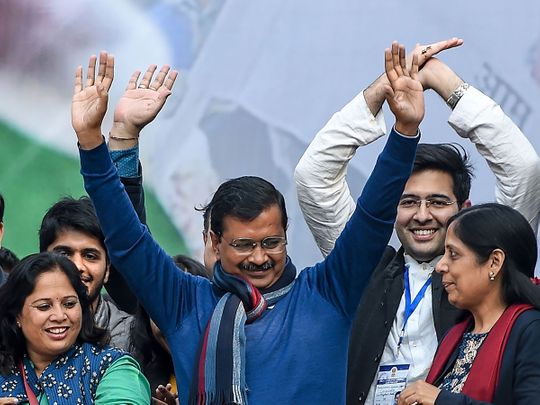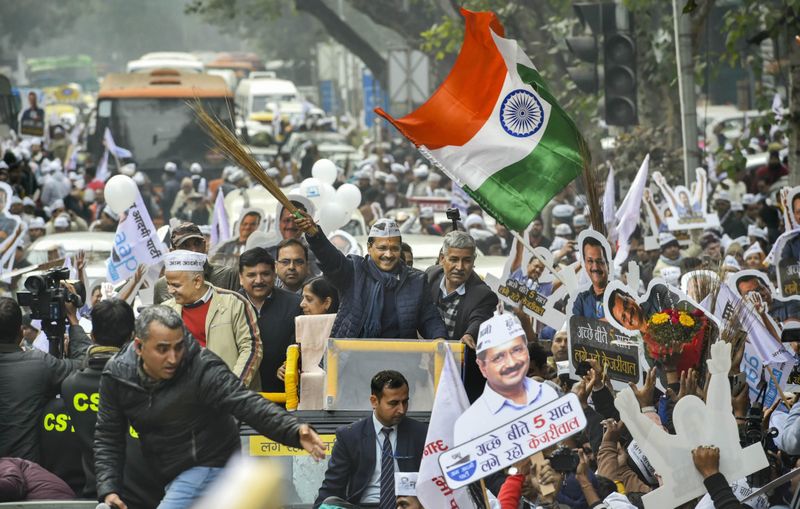
In the elections to the Guwahati Municipal Corporation in April, India's ruling Bharatiya Janata Party (BJP) along with its allies won 58 out of 60 seats in April. Guess who won the remaining 2? No, not the opposition Congress party. It was the Aam Aadmi Party (AAP).
The AAP did not even contest all the seats. Apart from winning 2, they stood runner up in another 2. This is not a state where the party invested any energy. These 2 surprise seats in a civic body election tell you a larger story of Indian politics today: Indian voters are desperate to fill the vacuum a moribund Congress party is leaving behind.
Nature abhors a vacuum. Circa 2022 is a golden period for new parties and politicians. Anyone who has the patience and courage to play the long opposition game today will be rewarded in a decade or three.
Luckily for the AAP, it has virtually no challenge in pitching itself as the new main national opposition party. It can happen as soon as the 2024 general elections.
A historic opportunity
An important milestone in this regard will be the upcoming Gujarat assembly elections. The Congress has left the field open for the AAP. It is for Arvind Kejriwal to prove his mettle and win more seats and vote share than the Congress.
Despite significant traction, the AAP is at number three in Gujarat as of now. But it has at least 5 months to change that. There is little doubt the BJP will win the state, and it will likely be a handsome victory. The contest is for the number 2 spot.
If AAP can make itself the main opposition party in the home state of Prime Minister Narendra Modi and Home Minister Amit Shah, it will be a huge announcement of arrival. Across India, it will be clear to non- and anti-BJP voters that the Aam Aadmi Party is the new Congress.
The last time the Congress party won a majority in an election in Gujarat was in 1985. Most Indians alive today were not even born in 1985. Yet the Congress, by virtue of being the main opposition party, has won at least 35% votes every election.
Imagine the frustration if you are a Congress voter in Gujarat. You keep voting for Congress every election, knowing your party is going to lose. If in such a situation the AAP can’t even become the second largest party, the failure will be that of the AAP.

Urban desire
The maths of the BJP’s dominance is that it sweeps the large urban centres in and around Ahmedabad, Baroda and Surat. And then it picks up a few rural and tribal belt seats. The Congress wins almost nothing in urban Gujarat, and does middlingly well in rural and tribal seats.
There is no state in India where the urban-rural divide is reflected as acutely in elections as in Gujarat. In urban Gujarat, the Congress is not weak, it is non-existent. It is tough to even find a Congress worker in many booths. It is therefore no surprise that like Assam, the initial traction for the Aam Aadmi Party in Gujarat began from urban municipal elections.
In the municipal corporation elections in Gandhinagar, the state’s capital populated heavily with government employees, the AAP won 22% vote share last year. This was mostly at the cost of the Congress party, whose vote share fell from 47% to 28%. The AAP’s 21% vote-share converted into only one seat but it was nevertheless a huge signal that many Congress voters are looking for a better alternative to take on the BJP.
Similarly the AAP has won 28% vote-share in Surat, 17% in Rajkot, 8% in Bhavnagar and 7% in Ahmedabad municipal elections.
From civic bodies to state
Riding on these impressive debut performances in civic elections, the AAP has become a serious player in the state assembly elections, due in December this year.
However, it is as of now being seen as a ‘vote cutter’ and not a Congress demolisher. For the AAP to replace the Congress and become the main opposition party in a few months is a tough task, but not an impossible one.
The AAP could either do a campaign like Delhi 2013, in which it overnight replaced Congress with just a few months of campaigning. Or it could end up like Goa and Uttarakhand, where the initial buzz around AAP fizzled out as voters couldn’t see the possibility of AAP replacing Congress.
The hurdle for AAP is to impress the rural voters, especially farmers. It has smartly tied up with Chotubhai Vasava’s Bhartiya Tribal Party to impress the tribal voter.
The party is launching a campaign to demand free electricity with an eye on farmers, claiming that they don’t get uninterrupted electricity supply and alleging that Gujarat has the most expensive electricity in the country. Focusing on the under-developed and neglected Saurashtra region will be key.
AAP has structural weaknesses which it may not be able to overcome in a few months. Firstly, it is weak when it comes to building and strengthening the party organisation.
The national hype around AAP and its governance claims and massive advertising can only take them so far. It is workers who get out the vote. And it is recognisable, ‘winnable’ local faces whom people like to elect as their representatives in the state assembly.
AAP is not only weak on these counts, it faces an aggressive BJP out to poach AAP’s leadership across India to ensure it is unable to convert sentiment into votes.
Playing the cards right
Given the challenges it faces in Gujarat, this is a good election to test whether Arvind Kejriwal has matured as a politician. If he is smart, he will focus on 15-20 ‘winnable’ seats rather than worrying about declaring a CM candidate.
Nobody cares about the CM candidate unless they were going to have a personality cult campaign around that face. Neither their state chief Gopal Italia nor their star face Isudan Gadhvi have the ability to carry a personality cult campaign.
Convincing Gujarat’s voters that most non-BJP voters are voting for AAP is what it will take to become number 2. Arvind Kejriwal has the fire in the belly to pull this off, but does he have the ability and skills?
The AAP’s impressive performance in Punjab, winning a landslide victory, has also been explained away by critics as an exception. It is a Hindu minority state, both Akalis and Congress were unpopular, the BJP was hardly a factor, and so on.
If the AAP can show some magic in Gujarat, it can change the course of national politics.








